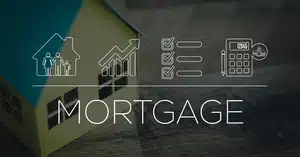Are you looking to buy a home and want to know what the banks will look at when considering your mortgage application? This article explains the mortgage lending criteria in New Zealand so you can take informed steps towards getting your own home.

Overview of mortgage lending criteria
When looking at an application, lenders will consider:
- Deposit (LVR)
- Affordability (income, debt, expenses)
- Credit rating (risk)
Deposit criteria for mortgages
When talking about house deposits, the key term is loan-to-value ratio (LVR). LVR refers to the percentage of the house purchase covered by a loan versus the percentage covered by your deposit.
First home buyers
If buying your own home, the LVR at a main bank is generally a minimum of 20% for an existing home and a 10% deposit for new builds. Depending on their mortgage volume and internal policies, banks will sometimes lend over these LVR thresholds for a small number of mortgages. For more details, see our blog on how much deposit to buy a house.
If you’ve been in the KiwiSaver scheme for three or more years and are a first-home buyer, you can use your KiwiSaver towards the deposit.

Property investors
If you’re buying an investment property, then you’ll usually need a 30% deposit to get a loan from a bank. If using a non-bank lender, you often only need 20%. However, this option may cost more than going to a bank.
New builds are exempt from investment LVR restrictions. With the right property, you can get a new build bank loan with a 10% deposit.

Affordability criteria for mortgages or home loans
When lenders look at whether an applicant can afford a loan they consider the person’s income, debt, and expenses/spending habits. They then calculate the mortgage repayments at approximately 8.95%. The high interest test rate is to ensure that clients can maintain their loans even if interest rates increase.
Income and debt
When calculating income, lenders take into account loan repayments of any current debt. They also consider liabilities such as overdrafts and credit card limits.
As of July 2024, debt-to-income (DTI) ratio restrictions apply. DTI ratios are calculated by the total debt divided by the total gross income. The current DTI ratio is six; lending over that ratio is restricted.
If you have been self-employed for less than two years, getting a mortgage with a bank may be difficult. But don’t worry; there are other options outside the main banks. Check out our blog on how to get a mortgage if self-employed for less than 2 years.
Expenses and spending habits
The Responsible Lending Code requires banks to ensure any loan is affordable for the borrower. To this end, banks require three months of bank statements as part of their assessment. But if you’ve just splurged on an expensive holiday, don’t panic! The Responsible Lending Code accounts for the fact that discretionary expenses like meals out and holidays can be reduced or eliminated.
Am I too old to get a mortgage?
Lenders can’t judge you based on age, but they still need to ensure you meet the lending criteria. The average loan term is 25 or 30 years, so getting a mortgage later in life could mean you end up with mortgage debt when you retire.
So, how do older people buy a home? Ways to increase your chances of loan approval later in life include:
- Have a plan to repay your mortgage before retirement. The plan could include accessing a superannuation fund, savings, or sale of property to repay your mortgage before retirement.
- Explore whether your budget would support a repayment schedule that will pay off the mortgage before you stop working.
- Work with a mortgage adviser who will know which lenders are more likely to give loans to older applicants.
- Pay off existing debt where possible.
- Save a bigger deposit.
The phrase “you are never too old” rings true, although there will be some added complexities that your mortgage adviser will deal with. All lenders have different rules, but that is for your adviser to worry about!

What credit score is needed to buy a house?
When you apply for a mortgage in New Zealand, lenders check your credit score and credit file carefully to determine the amount of risk in lending to you. They find out if you are a high or low credit risk by examining information from credit reference companies like Credit Simple.
Paying your bills on time will help maintain a good credit history and improve your mortgage options. For more information, check out our blog on everything you need to know about credit scores.
If you are concerned about your credit rating or credit history and how it may affect your application, check out our blog on how to get a mortgage if I have bad credit.
We are your mortgage lending criteria experts
Mortgage lending criteria can be complex and changeable and differ from lender to lender. But you don’t need to navigate through the maze – that’s what we’re here for! Contact us today for a no-obligation chat to find out how we can help.